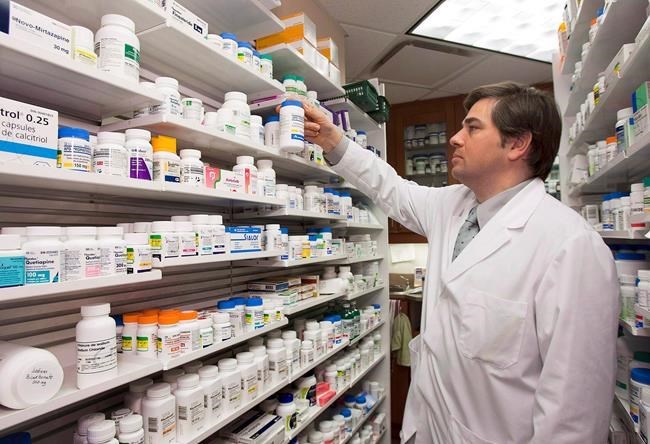
Pharmacist Denis Boissinot checks a bottle on a shelf at his pharmacy on March 8, 2012 in Quebec City. Groups representing doctors, nurses and pharmacists are welcoming a new era of virtual care they'd like to see persist well beyond the COVID-19 outbreak. In addition to making medical visits more convenient for those patients who can now get consults and prescriptions by phone or online, a rapid expansion of tech-friendly care is being regarded as a key step to shielding frontline workers from possible infection while alleviating strain on clinics and hospitals expecting COVID cases to climb. THE CANADIAN PRESS/Jacques Boissinot
March 18, 2020 - 12:13 PM
TORONTO - Groups representing doctors, nurses and pharmacists are welcoming a new era of virtual care they'd like to see persist well beyond the COVID-19 outbreak.
In addition to making medical visits more convenient for those patients who can now get consults and prescriptions by phone or online, a rapid expansion of tech-friendly care is being regarded as a key step to shielding frontline workers from possible infection while alleviating strain on clinics and hospitals expecting COVID-19 cases to climb.
The Canadian Medical Association is among those pushing for provincial governments to entrench newly introduced billing codes as permanent virtual care measures, noting many of them are considered emergency codes to address the viral outbreak.
CMA spokeswoman Gigi Osler says she'd like to see a nationwide commitment to virtual care options.
"COVID-19 is forcing all of our hands to start delivering virtual care and right now," says Osler, an ear, nose and throat surgeon at Winnipeg's St. Boniface Hospital.
"Why can't it stay?" asks Osler, who began taking advantage of Manitoba's expanded coverage this week.
British Columbia introduced new measures that expand the scope of consultations covered by the existing telehealth fee code. An end date will be determined by the provincial health officer, notes the website for the General Practice Services Committee, which includes representatives for B.C. doctors, government and health authorities.
Ontario also began temporarily covering phone and video consults over the weekend for insured Ontarians seeking medical help, including psychiatric care and specialist consults. It also began deploying about 130 more nurses to its Telehealth service, which already provides health advice by phone but has been slammed by an increase in daily calls. On Wednesday, the province acknowledged technical issues with the line.
Meanwhile, several provinces have launched online assessment tools to help determine whether someone should be tested for COVID-19, whose possible symptoms include cough, runny nose, fever or sore throat.
Anyone with severe symptoms should seek medical attention or call 911.
On Tuesday, Canada's top public health officer said innovative leaps toward virtual care and telemedicine in the wake of COVID-19 will be "a legacy of the outbreak itself."
Theresa Tam lauded measures to ease the potential impact on resources and hospital beds that will be needed for the small percentage of patients who suffer the disease's more severe respiratory symptoms.
That includes the postponement of elective surgeries and other non-essential hospital procedures.
"They are using telemedicine in a way that I feel to be maybe a legacy of the outbreak itself," Tam said.
"People are using innovations to try and get care to people in different ways, that includes also having billing codes for physicians who are doing these consultations remotely. So what you're trying to do is increase the maximum ... capacity for the health system to treat those who have more serious presentations of the COVID virus."
Some patients with upcoming appointments are being told there's a good chance their visit may be cancelled or changed to a virtual or phone visit, if deemed not medically urgent.
In addition to protecting patients, nurses and doctors from possible infection, that saves time and preserves personal protective gear such as masks that are in limited supply, says the head of the Registered Nurses' Association of Ontario.
"We all should be moving to a lot more virtual than what we do. The public will love it," says Doris Grinspun.
Meanwhile, the Ontario Pharmacists Association is offering its own version of virtual care by encouraging customers call in their prescriptions and request home delivery.
Allan Malek, executive vice president and chief pharmacy officer, says patients can also call their community pharmacist for advice on relatively minor ailments if frustrated by telehealth wait times.
His group is also pushing for the ability to assess minor health conditions that might require a prescription, such as an uncomplicated urinary tract infection or pink eye.
"These are certainly bothersome conditions; they're contagious conditions," says Malek, noting Ontario pharmacists already have the authority to refill prescriptions.
"These are conditions that don't require a fulsome physical examination and so pharmacists can do this ... in a counselling room with a two-metre distance between the pharmacist and the patient."
For the CMA, the biggest challenge to scaling up virtual care is not technology but governance and policy.
The group released a report in February along with the College of Family Physicians of Canada and the Royal College of Physicians and Surgeons of Canada calling for national leadership in a sector where much of the growth has come in the private non-insured sector, outside provincial medical care plans.
Among their requests: a simplified process to register and license qualified doctors to provide virtual care across provincial and territorial boundaries.
"When you look at the speed at which this pandemic has forced the hands of decision-makers to implement virtual care, it shows it can be done and it shows that patients want it," says Osler.
"It's much-needed technology to relieve the burden in the health-care system now and in the future."
This report was first published by The Canadian Press on March 18, 2020.
News from © The Canadian Press, 2020